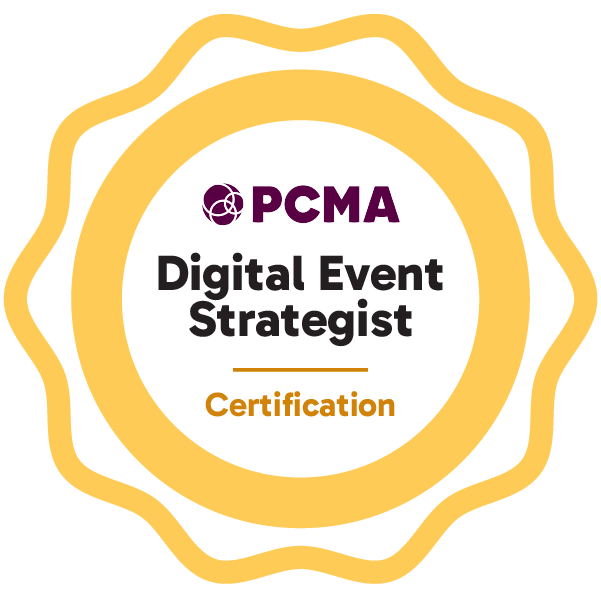Digital Event Strategist (DES) Certification Certificate OD

COURSE OVERVIEW
Once seen as a temporary “pivot”, digital events are now more critical to business success than ever before. As technology evolves, and the lines between virtual, hybrid, and in-person events blur, organizations without a strong digital event strategy in place will fall behind as competitors capture audiences with exciting, blended experiences.
Enter the newest iteration of the DES certification. This new and improved course offers access to the top experts in the business events industry, who will show you how to move past outdated digital event models, and stay two steps ahead in a new landscape marked by innovative hybrid experiences and the arrival of the metaverse.
Earn the certification that will place you at the forefront of tomorrow’s event industry.
COURSE FORMAT
On-demand courses can be completed on your own schedule. Following enrollment, students have one year to complete their online course and earn their certificate of completion. Course content is delivered via pre-recorded videos and supplemental materials.
DES Certification Includes
- 8-module online course
- Over 10 hours of content
- On-demand learning to become an expert at producing, selling and marketing virtual and hybrid events
- Live panel discussion & Q&A with experts
- Access to pre-recorded Q&A sessions
- Full access to webinars with experts in the virtual and hybrid events industry
- Downloadable learning resources
- Access to final exam included
- Globally recognized DES Certificate, shareable online via Sertifier
- Access to DES graduates Community (peers & subject matter experts to network and share resources).
- 10 CMP credit hours
Module 1: Introduction + Industry Overview
- Learn the benefits of a producing a virtual event the best use cases for them
- Learn the nuances of a virtual event vs. a hybrid event
- Learn the roles and team members to consider when producing a virtual event
- Learn about the types of virtual events
Module 2: Strategy + Event Business Models
- Lay the foundation upon which your virtual event will build upon
- Gain an understanding of the strategic planning process and timeline from start to finish
- Learn what key considerations should be identified in advance, including your audience, stakeholders, budget, and team members
- Learn what to take into account when defining your event type
Module 3: Monetization + Exhibitors and Sponsors
- Gain an understanding of direct and indirect revenue types and the importance of considering both
- Monetization is more than just revenue; it is your desired outcome for an event or program
- Consider the many unique monetization options available for digital events, including registration, content, sponsorships, brand extension, lead generation, and lead scoring
- Accurately measure and report monetization data
Module 4: Experience Design + Audience Engagement
- Learn how to structure your agenda for virtual and hybrid events
- Design content for your virtual and hybrid event sessions
- Manage and support your event’s speakers
- Boost interactivity with virtual participants
- Enhance networking opportunities for your attendees, speakers, sponsors, exhibitors, and staff
Module 5: Platform + Technology Selection
- Learn how to choose a virtual platform and make a technology selection based on clear criteria
- Utilize an efficient comparison methodology to avoid going too deep on each platform
- Engage potential vendors strategically to accelerate your learning and selection process
Module 6: Production + Live Event Management
- Create your production timeline with specified roles and deliverables
- Plan your content, environment, and communication production
- Specify days for testing and QA
- Best practices for live event day preparations and readiness
Module 7: Marketing + Communities
- Campaign timeline development
- Identify your audience and necessary communications channels in order to develop a robust event marketing plan
- Use social media, video, email, and content to drive engagement with different segments of your audience
- Build a community around your event to create long-term revenue growth for your organization
Module 8: Reporting + Measurement + ROI
- Prioritize key stakeholders, data types, and data sources before designing your event experience
- Identify Key Performance Indicators (KPIs), Return on Investment (ROI), and Return on Events (ROE) for your digital events
- Evaluate direct and indirect revenues, attendee, and sponsor data (content consumption, activities, satisfaction etc.)
- Demonstrate your digital event’s ROI for key stakeholders with rich narratives and insights (not raw data)
Group Purchase
Ready to get started?
Feel free to get in touch with your questions

